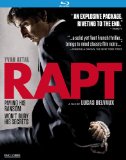| Reviews & Columns |
|
Reviews DVD TV on DVD Blu-ray 4K UHD International DVDs In Theaters Reviews by Studio Video Games Features Collector Series DVDs Easter Egg Database Interviews DVD Talk Radio Feature Articles Columns Anime Talk DVD Savant Horror DVDs The M.O.D. Squad Art House HD Talk Silent DVD
|
DVD Talk Forum |
|
|
| Resources |
|
DVD Price Search Customer Service #'s RCE Info Links |
|
Columns
|
|
|
Rapt
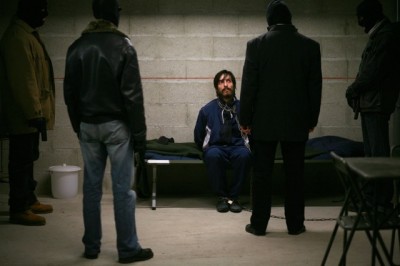
"Industrial continuity is ensured, whatever happens."
Lucas Belvaux's cool, elegant Rapt is a timely enough thriller, involving as it does the kidnapping and ransoming of a high-rolling, cocky, jet-setting corporate/financial CEO who has everything, loves to display it (if ever so nonchalantly), and has thus made himself something of a high-profile target. But in the actual experience, those contemporary touches in Rapt's story are rather superficial and never amount to much over the course of the film (although we certainly can infer that in the world as depicted by Belvaux, no-one's family, emotional well-being, or individual interests will be allowed to disrupt "industrial continuity," even if you happen to be part of the 1%). No, what is most remarkable about Belvaux's film is the lean, existentialist darkness it attains through its expertly deployed classical storytelling.
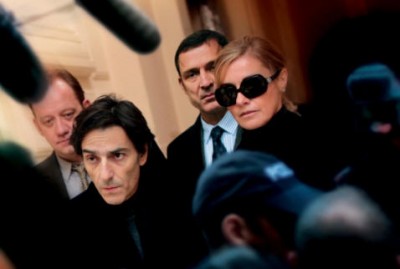
Stanislas Graff (Yvan Attal, Munich), head of a very large and important French corporation that employs more than 100,000 people (one definitely gets the feeling that it's too big to fail), is the kind of guy who's accustomed to hobnobbing with high-level government officials up to and including the French President and having his every desire gratified. Despite the massive responsibilities on his shoulders, he finds plenty of time for his reckless, high-stakes gambling addiction (he can lose 50,000 euros in a poker become without becoming visibly upset); maintain both a family life in a palatial house with his beautiful wife, Françoise (Anne Consigny, A Christmas Tale), and their two teenaged daughters; and drop in frequently to an equally luxurious flat where he keeps his mistresses. His hard, no-bullshit mother (Françoise Fabian), who lives in the house with her son's family, observes everything with a cynical, forthright eye; she tolerates all behaviors, it seems, but disdains the hypocritical illusions of decency and morality that those around her seem devoted to. One day, during the normal course of his chauffeured business, Graff is kidnapped at gunpoint, taken away to a dark, unknown location, and held prisoner by masked gunmen who immediately, gruesomely amputate one of his fingers, sending it along to the authorities as a warning to Graff's family and the fellow major shareholders who pass for his friends that the 50 million euro ransom they're demanding is non-negotiable and payable immediately.
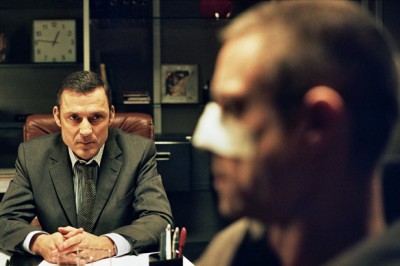
The film then alternates between Graff's ordeal--the horror of which gives way to a certain tense routine after the initial, shocking act of violence--and that of his family and "friends," with plenty of nicely done suspense regarding whether the ransom will be made available by his family and trustees, or even exists after Graff's spendthrift depletion of his wealth; whether the threat to remove and deliver more fingers will be carried out; and just who the perpetually masked, mysterious kidnappers are. But the more interesting suspense that Rapt has to offer is of the moral variety. As we go back and forth between the world where Graff's potentially violent kidnappers are never less than forthright and honest (and, ultimately, merciful) with Graff and the one in which his troubled family and scheming, self-interested colleagues plot and argue about how to deal with the situation reveals layer after layer of compromised, conditional, or complacent care or respect for Graff, particularly as his own very flawed and compromised nature is revealed to the world. The moral murkiness of the privileged, seemingly safe world from which George has been taken into his Spartan imprisonment is underscored by Belvaux and cinematographer Pierre Milon's (The Class) rack focusing and variegated lighting, while his frightening imprisonment is stark and clear, either pitch-black or the full-on glare of flashlights and fluorescent bulbs. (Also worth mentioning is Riccardo del Fra's sometimes propulsive, sometimes melancholy, always understated score.) We, like Graff when he finally returns to his pre-abduction life only to discover that it will now, with its shaky skeleton laid bare, only be a different kind of prison than the one he has been released from, cannot be sure that the kidnappers (along with Graff's mother, who shares their coolly pragmatic attitude) aren't the ones who have, if not the better moral code, than at least the superior moral clarity and lack of hypocrisy.
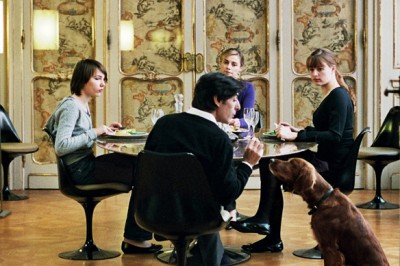
Belvaux made his name with The Trilogy, a cinematic triptych released back in 2002, with which he demonstrated an impressive skill as a pastiche artist by telling one story over a trio of films, each done in a markedly distinct style (from comedy to thriller to drama), each of which he seemed to have miraculously mastered all the ins and outs of. What he channels here, with equal expertise, is the calm nihilism that marked the chillier thrillers of Claude Chabrol (La Cérémonie, Just Before Nightfall) as well as the streamlined-verging-on-abstract narrative and visual stylings of Jean-Pierre Melville (Army of Shadows, Le Cercle Rouge). Belvaux may have yet to demonstrate any very clear or striking personal voice and vision that would mark him as a true, visionary auteur, but he has done his homework and chosen the influences he wears on his sleeve very well, and Rapt easily convinces us that one doesn't need to be a great artist to make a smart, precise, and surprisingly disturbing movie. Belvaux brings enough taste, restraint, focus, and studied know-how to the table here to make his abilities as an able craftsman seem more than sufficient to earn Rapt our interest, close attention, and applause.
THE BLU-RAY DISC:
The AVC/MPEG-4, 1080/24p, 2.35:1 anamorphic widescreen transfer is fantastic. This is a dark film overall, with all kinds of subtle nuances in its light, color, and shadows, and it all comes through without a glitch. Blacks are rock solid and without a trace of discernible crushing, the skin tones are excellently natural, and the image retains a lovely cinematic texture throughout.
Sound:The DTS-HD Master Audio 5.1 soundtrack (in French with optional English subtitles) is great, as well. All of the film's well-designed sound emerges with luxurious fullness, clarity, and dimensionality, and are well-balanced as they come out of your speakers from every direction, whether it's the background/ambient noise of a posh boardroom or the deeper bass pounding in the more propulsive stretches of Riccardo del Fra's score.
Extras:None other than the film's theatrical trailer, a gallery of 20 or so stills, and a handful of trailers for other Kino-Lorber releases such as The Robber (which would actually make a nice double feature with Rapt) and City of Life and Death.
FINAL THOUGHTS:A classically well-done thriller that keeps its poker face on until the end (and even beyond), Rapt is a quietly unsettling experience that does all the right things in all the right ways, with well-focused energy and a moody, philosophical/contemplative streak that gives it just the extra shadings of noirish darkness it needs to make it more memorable than your typical well-crafted thriller. It's not terribly original; one could even say it's something of a well-rehearsed exercise in doing a familiar kind of film particularly well. But if so, it's an exercise performed so well, so confidently, and with such a finely-tuned and perceptive understanding of how this kind of film can be made to work in the most polished and elegant manner, you finish it much more gratified by its flawless execution than critical of its lack of more unique or ambitious moves. Recommended.
|
| Popular Reviews |
| Sponsored Links |
|
|
| Sponsored Links |
|
|
| Release List | Reviews | Shop | Newsletter | Forum | DVD Giveaways | Blu-Ray | Advertise |
|
Copyright 2024 DVDTalk.com All Rights Reserved. Legal Info, Privacy Policy, Terms of Use,
Manage Preferences,
Your Privacy Choices | |||||||









